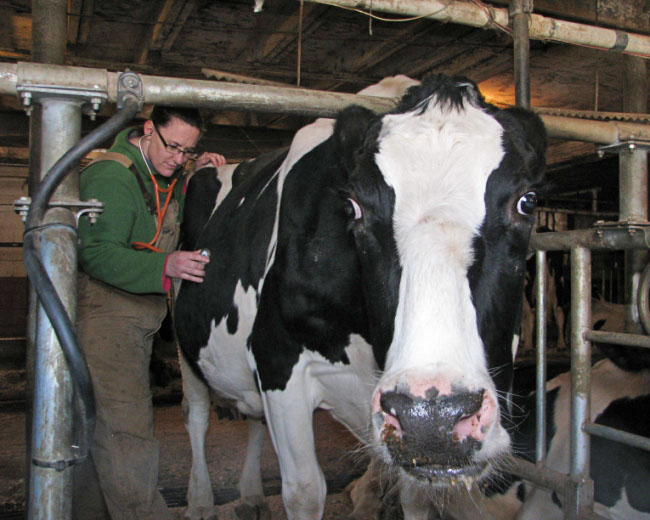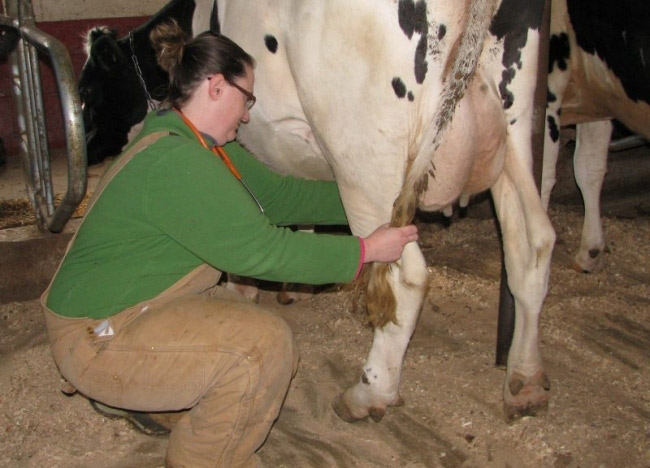Michaela Fry (DVM '08): Central Pennsylvania veterinarian is in high demand
profile by Tabitha Goodling; reprinted with permission from Lancaster Farming
July 24, 2015

EAST WATERFORD, Pa. — When a farmer calls Michaela Fry, the situation at the farm is almost always a serious one.
It’s those calls in the middle of the night, when a farmer is struggling to get a breeched calf to emerge, that they call Fry, the “lady veterinarian,” who shows up on a regular basis for routine checks on those same animals.
Fry, a small and large animal veterinarian from East Waterford, Juniata County, Pennsylvania, splits her time between the veterinary clinics in Juniata and Mifflin counties and the farms in the area.
Fry graduated from Virginia-Maryland College of Veterinary Medicine in 2008. She is part of a mixed animal practice and is the only large animal veterinarian in the Pleasant View Vet Clinic in Mifflintown and Lewistown, Pennsylvania.
Fry said she had always wanted to work with animals, but did not get involved with livestock until her freshman year at Wilson College. She did, however, have a background in horses and racing those horses during her childhood.
Fry also serves farms in Huntingdon and Snyder counties in central Pennsylvania and works with white-tailed deer in addition to the more typical beef and dairy animals, sheep, swine and poultry.
Because of a lack of vets in her clinic, Fry spends 30 hours of the week in one of the office locations and 30 hours visiting farms.
“Tuesdays and Thursdays I am typically working with large animals, and I go to certain farms for herd health, pregnancy checks, dehorning calves and sick cows.”
A sick cow is common in the winter months, Fry said. She typically sees cows with pneumonia then. She said that twisted stomach in cows is normal all year long.
Fry was recently visiting the Glen Peachey Dairy Farm near the village of Cross Keys in Juniata County. She was specifically working with five cows but always gets a look at every animal on the property.
“I visit an average of 25 farms a week ... mostly small herds. None of them have more than 150 cattle.” She said she keeps the farms updated with all vaccinations and vaccination protocol. She also performs castrations and aids in reproduction and artificial insemination.
Another way Fry ends up on a farm is when she gets the call.
“My farmers are all very good. When they call me, it’s really bad,” she said.
This is usually the case with emergency calvings. Those late-night calls also sometimes involve sheep and goats.

One emergency call Fry will never forget happened in April 2011 when a tornado struck many of the farms she visits in the East Waterford area.
“I had to come in and take care of the animals,” she said, some of which were trapped under debris.
“It was really emotional for everyone — friends, neighbors. It’s such a small community. The toughest part was losing some of the animals. Sometimes you just can’t help them,” she said.
Fry admitted it bothers her personally when an animal is near death or has died.
“Certain cases haunt me until I can figure it out.”
This happened once with a cow at the Peachey farm. The cow was very ill, and the Peacheys did not think she was going to make it.
The cow was experiencing bloody diarrhea and milk fever. Fry spent her time away from the farm researching to try to figure out what was making her so ill. After days of trying to understand the situation, the cow miraculously pulled through.
“Some pull through, and some don’t. When they don’t make it, I take it very personally,” Fry said. While losing animals to disease or accidents is the hardest part of her career, Fry said the best part of her job is the interaction.
“The best part is being on the farm with the farmers and the animals. I have tons of clients, and they are all very enjoyable.”
Fry is also the 4-H leader for the Just Kidding Around Goat and Sheep Club in Juniata County. “I love to teach. 4-H is my favorite way of teaching,” she said.
Fry loves 4-H so much that she takes her summer vacation during the Juniata County 4-H Youth Fair. Fry also has held classes on various animal care topics and gone to local schools to speak to students.
“Continuing education is important for me,” she said.
She never misses the Western Veterinary Conference each year.
“I will continue to be on the forefront of medicine,” Fry said.
Being a female veterinarian in the barnyard is more common today than it had been years ago, but Fry said she still had to prove herself and her expertise.
“I was a very young female when I started on my own. I had a lot of Amish clients, so I had to prove myself.”
Fry said she was always secretly worried about being physically strong enough to handle large animal medicine. She said it was difficult in those early years, and she made some mistakes. But, she added, she learned very quickly to ask for help. If a farmer is available to help hold an animal, Fry asks him to assist. “I learned to work smarter, not harder,” she said.
Now those same farmers call on Fry in the scariest moments of farming. Fry said she has come a long way from that young, new, nervous vet. She may not be able to save every animal in an emergency, but she knows that after years of experience on the farm, she has the trust of her farmers. And that is what matters most.
This article was originally published in Lancaster Farming on Feb. 21, 2015.


